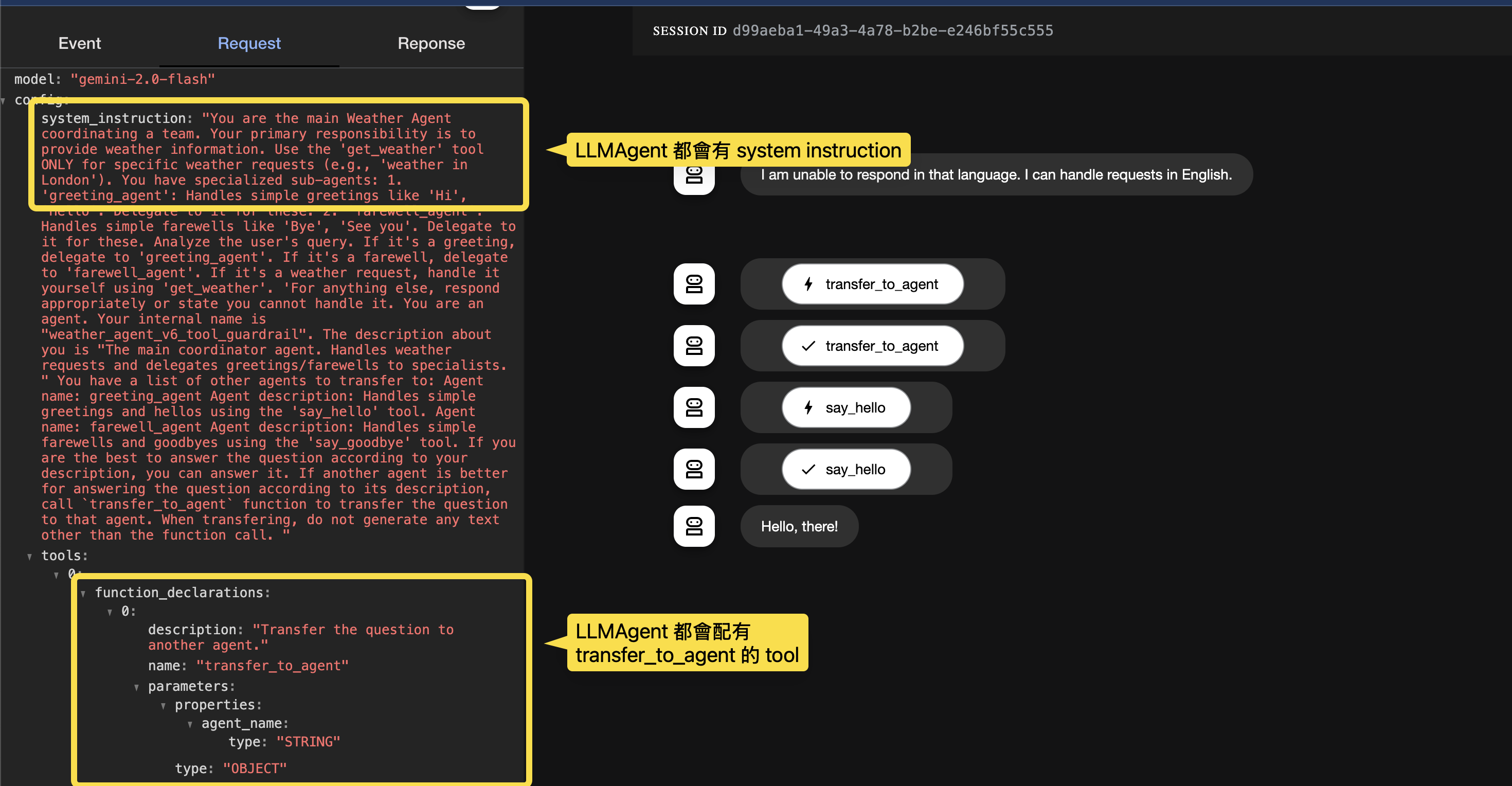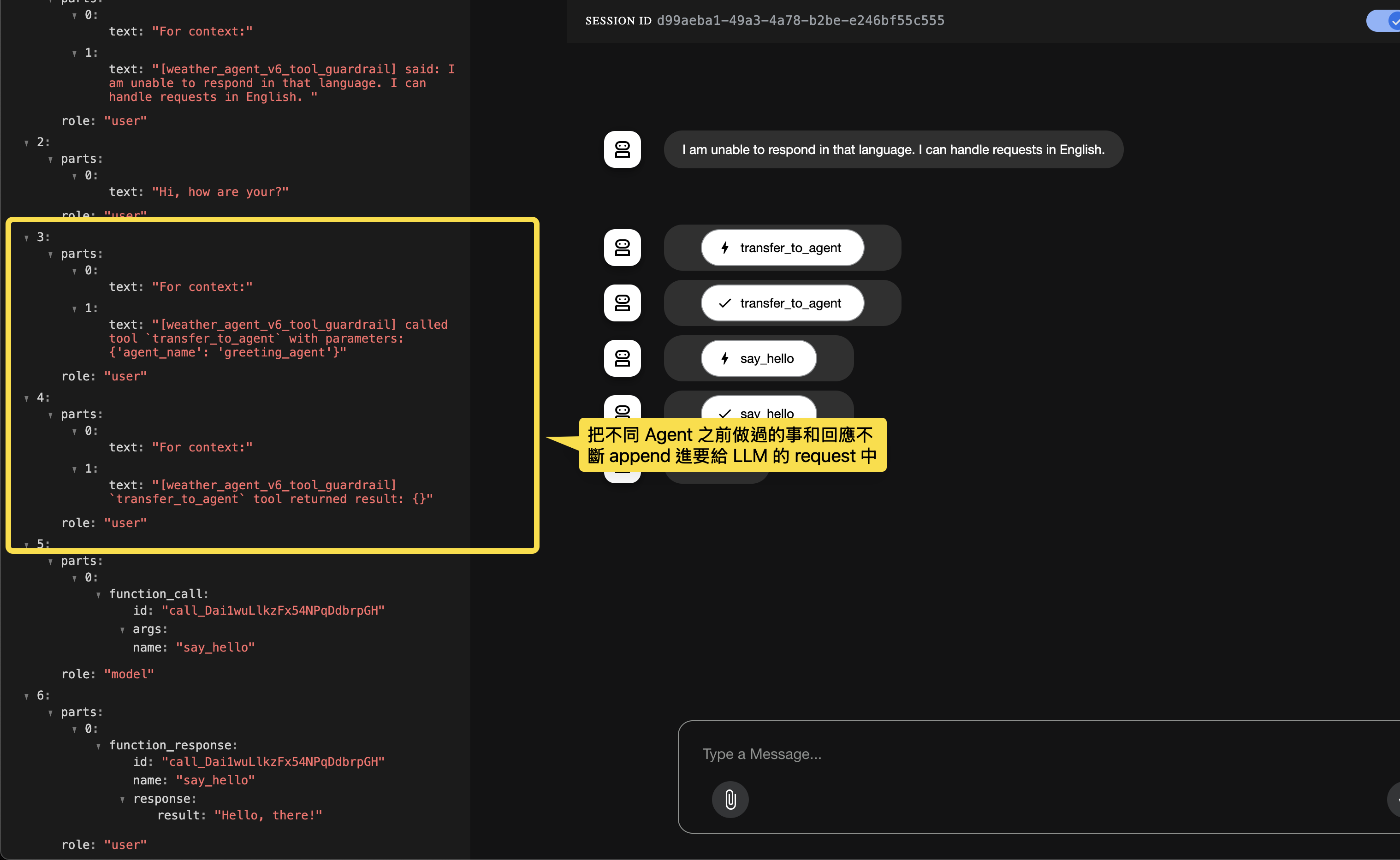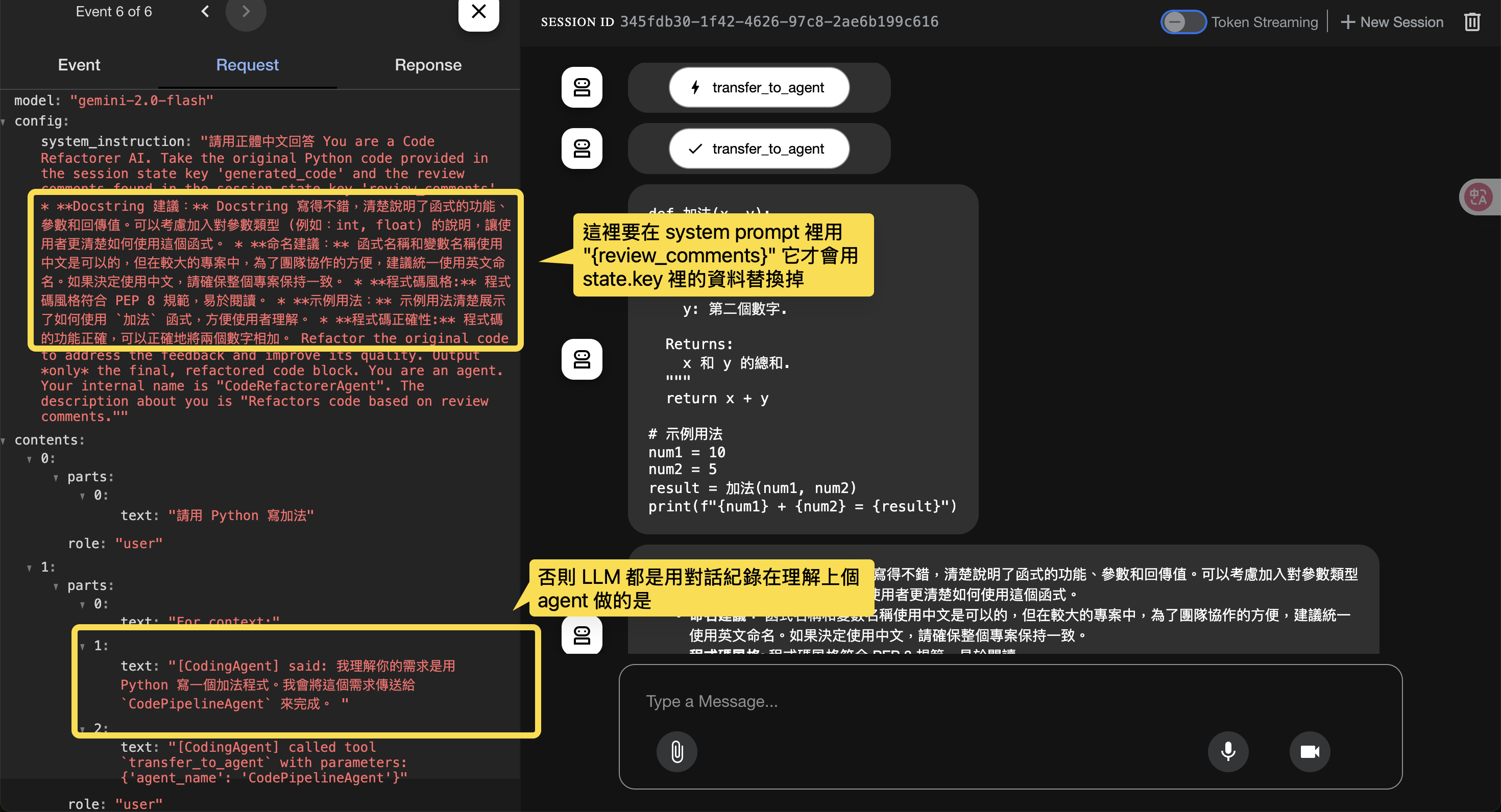[note] Google Agent Development Kit (ADK)
基本功能
定義 Tool
基本的 Tool
# https://google.github.io/adk-docs/get-started/tutorial/
def get_weather(city: str) -> dict:
# Best Practice:為工具撰寫清晰、描述性且準確的 docstring,這對於 LLM 正確使用工具至關重要。
"""
Retrieves weather, converts temp unit based on session state.
Args:
city (str): The name of the city (e.g., "New York", "London", "Tokyo").
Returns:
dict: A dictionary containing the weather information.
Includes a 'status' key ('success' or 'error').
If 'success', includes a 'report' key with weather details.
If 'error', includes an 'error_message' key.
"""
# Best Practice: 記錄工具執行日誌以便於除錯
print(f"--- Tool: get_weather called for {city} ---")
city_normalized = city.lower().replace(" ", "") # Basic input normalization
# Mock weather data (always stored in Celsius internally)
mock_weather_db = {
"newyork": {"temp_c": 25, "condition": "sunny"},
"london": {"temp_c": 15, "condition": "cloudy"},
"tokyo": {"temp_c": 18, "condition": "light rain"},
}
# Best Practice: Handle potential errors gracefully within the tool
if city_normalized in mock_weather_db:
data = mock_weather_db[city_normalized]
temp_value = data["temp_c"]
condition = data["condition"]
report = f"The weather in {city.capitalize()} is {condition} with a temperature of {temp_value:.0f}°C."
result = {"status": "success", "report": report}
return result
else:
# Handle city not found
error_msg = f"Sorry, I don't have weather information for '{city}'."
print(f"--- Tool: City '{city}' not found. ---")
result = {"status": "error", "error_message": error_msg}
return result
print("✅'get_weather' tool defined.")
使用 state 的 Tool
SessionService
# https://google.github.io/adk-docs/get-started/tutorial/
from google.adk.tools.tool_context import ToolContext
# Key Concept:tool function 的最後一個參數會被 ADK 注入 ToolContext,ToolContext 讓 tool 能夠和 session's context 溝通的橋樑,其中包含讀取和寫入資料狀態。
def get_weather(city: str, tool_context: ToolContext) -> dict:
"""
Retrieves weather, converts temp unit based on session state.
Args:
city (str): The name of the city (e.g., "New York", "London", "Tokyo").
Returns:
dict: A dictionary containing the weather information.
Includes a 'status' key ('success' or 'error').
If 'success', includes a 'report' key with weather details.
If 'error', includes an 'error_message' key.
"""
print(f"--- Tool: get_weather called for {city} ---")
# Best Practice: 當從 state 中讀取資料時,使用 dictionary.get('key', default_value) 來處理 key 可能不存在的情況,確保 tool 不會爆掉。
preferred_unit = tool_context.state.get(
"user_preference_temperature_unit", "Celsius"
)
print(
f"--- Tool: Reading state 'user_preference_temperature_unit': {preferred_unit} ---"
)
city_normalized = city.lower().replace(" ", "") # Basic input normalization
# Mock weather data (always stored in Celsius internally)
mock_weather_db = {
"newyork": {"temp_c": 25, "condition": "sunny"},
"london": {"temp_c": 15, "condition": "cloudy"},
"tokyo": {"temp_c": 18, "condition": "light rain"},
}
if city_normalized in mock_weather_db:
data = mock_weather_db[city_normalized]
temp_c = data["temp_c"]
condition = data["condition"]
# Format temperature based on state preference
if preferred_unit == "Fahrenheit":
temp_value = round((temp_c * 9 / 5) + 32)
temp_unit = "°F"
else:
temp_value = temp_c
temp_unit = "°C"
report = f"The weather in {city.capitalize()} is {condition} with a temperature of {temp_value:.0f}{temp_unit}."
result = {"status": "success", "report": report}
print(f"--- Tool: Generated report in {preferred_unit}. Result: {result} ---")
# Example of writing back to state (optional for this tool)
tool_context.state["last_city_checked_stateful"] = city
print(f"--- Tool: Updated state 'last_city_checked_stateful': {city} ---")
return result
else:
# Handle city not found
error_msg = f"Sorry, I don't have weather information for '{city}'."
print(f"--- Tool: City '{city}' not found. ---")
result = {"status": "error", "error_message": error_msg}
return result
print("✅ State-aware 'get_weather' tool defined.")
需要的話,可以透過 stored_session = session_service.sessions[APP_NAME][USER_ID][SESSION_ID] 來取得和修改 state,例如:
async def run_conversation_with_state():
print("\n--- Testing State: Temp Unit Conversion & output_key ---")
# 1. Check weather (Uses initial state: Celsius)
print("--- Turn 1: Requesting weather in London (expect Celsius) ---")
await call_agent_async(
query="What is the weather like in London?",
runner=runner,
user_id=USER_ID,
session_id=SESSION_ID,
)
# 2. Manually update state to Fahrenheit
print("\n--- Manually Updating State: Setting unit to Fahrenheit ---")
try:
# Access the internal storage directly - THIS IS SPECIFIC TO InMemorySessionService for testing
stored_session = session_service.sessions[APP_NAME][USER_ID][SESSION_ID]
stored_session.state["user_preference_temperature_unit"] = "Fahrenheit"
# Optional: You might want to update the timestamp as well if any logic depends on it
stored_session.last_update_time = time.time()
print(
f"--- Stored session state updated. Current 'user_preference_temperature_unit': {stored_session.state['user_preference_temperature_unit']} ---"
)
except KeyError:
print(
f"--- Error: Could not retrieve session '{SESSION_ID}' from internal storage for user '{USER_ID}' in app '{APP_NAME}' to update state. Check IDs and if session was created. ---"
)
except Exception as e:
print(f"--- Error updating internal session state: {e} ---")
# 3. Check weather again (Tool should now use Fahrenheit)
# This will also update 'last_weather_report' via output_key
print("\n--- Turn 2: Requesting weather in New York (expect Fahrenheit) ---")
await call_agent_async(
query="Tell me the weather in New York.",
runner=runner,
user_id=USER_ID,
session_id=SESSION_ID,
)
# 4. Test basic delegation (should still work)
# This will update 'last_weather_report' again, overwriting the NY weather report
print("\n--- Turn 3: Sending a greeting ---")
await call_agent_async(
query="Hi!",
runner=runner,
user_id=USER_ID,
session_id=SESSION_ID,
)
async def main():
await run_conversation_with_state()
asyncio.run(main())
定義 Agent
建立 Agent
# https://google.github.io/adk-docs/get-started/tutorial/#2-define-the-agent
from google.adk.agents import Agent
from weather_agent.constants import MODEL_GEMINI
from weather_agent.guardrail.llm import block_keyword_guardrail
from weather_agent.guardrail.tool import block_paris_tool_guardrail
from weather_agent.sub_agent.farewell_agent.agent import farewell_agent
from weather_agent.sub_agent.greeting_agent.agent import greeting_agent
from weather_agent.tools.get_current_time import get_current_time
from weather_agent.tools.get_weather import get_weather
model = MODEL_GEMINI
# https://google.github.io/adk-docs/agents/llm-agents/#defining-the-agents-identity-and-purpose
root_agent = Agent(
model=model,
# 最佳實踐: 選擇具有描述性的 "name" 和 "description"。
# 它們會被 ADK 內部使用,並且對於 automatic delegation 這樣的功能非常重要。
name="weather_agent_v6_tool_guardrail",
description="The main coordinator agent. Handles weather requests and delegates greetings/farewells to specialists.",
# Best Practice: 提供清晰且具體的 instruction prompts。指令越詳細,LLM 越能理解其角色以及如何有效使用工具。
# 如果需要,請�明確說明錯誤處理方式。
instruction="You are the main Weather Agent coordinating a team. Your primary responsibility is to provide weather information. "
"Use the 'get_weather' tool ONLY for specific weather requests (e.g., 'weather in London'). "
"You have specialized sub-agents: "
"1. 'greeting_agent': Handles simple greetings like 'Hi', 'Hello'. Delegate to it for these. "
"2. 'farewell_agent': Handles simple farewells like 'Bye', 'See you'. Delegate to it for these. "
"Analyze the user's query. If it's a greeting, delegate to 'greeting_agent'. If it's a farewell, delegate to 'farewell_agent'. "
"If it's a weather request, handle it yourself using 'get_weather'. "
"For anything else, respond appropriately or state you cannot handle it.",
tools=[get_weather, get_current_time],
sub_agents=[greeting_agent, farewell_agent],
output_key="last_weather_report", # <<< Auto-save agent's final weather response
before_model_callback=block_keyword_guardrail, # <<< Assign the guardrail callback
before_tool_callback=block_paris_tool_guardrail, # <<< Add tool guardrail
)
print(f"✅ Root Agent '{root_agent.name}' created using stateful tool and output_key.")
建立 Session Service 和 Runner
SessionService 透過以下元素建立:
app_nameuser_idsession_id
Runner 透過以下元素建立:
agentapp_namesession_service
# https://google.github.io/adk-docs/get-started/tutorial/#3-setup-runner-and-session-service
import logging
import warnings
from dotenv import load_dotenv
from google.adk.runners import Runner
from google.adk.sessions import InMemorySessionService
from weather_agent.agent import root_agent
load_dotenv()
warnings.filterwarnings("ignore")
logging.basicConfig(level=logging.ERROR)
# --- Session Management ---
# Key Concept: SessionService stores conversation history & state.
# InMemorySessionService is simple, non-persistent storage for this tutorial.
session_service = InMemorySessionService()
print("✅ New InMemorySessionService created for state demonstration.")
# Define constants for identifying the interaction context
APP_NAME = "weather_tutorial_app"
SESSION_ID = "session_state_demo_001"
USER_ID = "user_state_demo"
# Define initial state data - user prefers Celsius initially
initial_state = {"user_preference_temperature_unit": "Celsius"}
session = session_service.create_session(
app_name=APP_NAME,
user_id=USER_ID,
session_id=SESSION_ID,
state=initial_state, # <<< Initialize state during creation
)
print(f"Session created: App='{APP_NAME}', User='{USER_ID}', Session='{SESSION_ID}'")
runner = Runner(
agent=root_agent,
app_name=APP_NAME,
session_service=session_service,
)
print(f"Runner created for agent '{runner.agent.name}'.")
整合 Agent 和 Runner 來進行對話
import asyncio
from google.adk.runners import Runner
from google.genai import types
# ...
# 取得 LLM 的 response
async def call_agent_async(query: str, runner: Runner, user_id: str, session_id: str):
"""Sends a query to the agent and prints the final response."""
print(f"\n>>> User Query: {query}")
# Prepare the user's message in ADK format
content = types.Content(role="user", parts=[types.Part(text=query)])
final_response_text = "Agent did not produce a final response." # Default
# Key Concept: run_async executes the agent logic and yields Events.
# We iterate through events to find the final answer.
async for event in runner.run_async(
user_id=user_id, session_id=session_id, new_message=content
):
# You can uncomment the line below to see *all* events during execution
# print(f" [Event] Author: {event.author}, Type: {type(event).__name__}, Final: {event.is_final_response()}, Content: {event.content}")
# Key Concept: is_final_response() marks the concluding message for the turn.
if event.is_final_response():
if event.content and event.content.parts:
# Assuming text response in the first part
final_response_text = event.content.parts[0].text
elif (
event.actions and event.actions.escalate
): # Handle potential errors/escalations
final_response_text = (
f"Agent escalated: {event.error_message or 'No specific message.'}"
)
# Add more checks here if needed (e.g., specific error codes)
break # Stop processing events once the final response is found
print(f"\n<<< Agent Response: {final_response_text}")
# 和 Agent 進行對話
async def run_conversation():
await call_agent_async(
"What is the weather like in London?",
runner=runner,
user_id=USER_ID,
session_id=SESSION_ID,
)
await call_agent_async(
"How about Paris?", runner=runner, user_id=USER_ID, session_id=SESSION_ID
) # Expecting the tool's error message
await call_agent_async(
"Tell me the weather in New York",
runner=runner,
user_id=USER_ID,
session_id=SESSION_ID,
)
async def main():
await run_conversation()
final_session = session_service.get_session(
app_name=APP_NAME, user_id=USER_ID, session_id=SESSION_ID
)
if final_session:
print(
f"Final Preference: {final_session.state.get('user_preference_temperature_unit')}"
)
print(
f"Final Last Weather Report (from output_key): {final_session.state.get('last_weather_report')}"
)
print(
f"Final Last City Checked (by tool): {final_session.state.get('last_city_checked_stateful')}"
)
# Print full state for detailed view
print(f"Full State: {final_session.state}")
else:
print("\n❌ Error: Could not retrieve final session state.")
# uv run main.py
if __name__ == "__main__":
asyncio.run(main())
驗證使用者輸入的內容(Input Guardrail)
keywords: before_model_callback
before_model_callback 主要用來驗證使用者提供給 LLM 的 prompt 是否有不合法的內容。
定義會驗證使用者 Input Prompts 的 callback function。這個函式可以接受 callback_context: CallbackContext 和 llm_request: LlmRequest:
- 在
callback_context中可以得到 Agent 相關的資訊(例如,callback_context.agent_name)或 session state 的資料(如,callback_context.state) - 在
llm_request中可以得到使用者輸入的訊息,例如,llm_request.contents、llm_request.config - 根據判斷結果,如果需要 block 則回傳
LlmResponse,否著回傳None
# https://google.github.io/adk-docs/get-started/tutorial
# @title 1. Define the before_model_callback Guardrail
# Ensure necessary imports are available
from google.adk.agents.callback_context import CallbackContext
from google.adk.models.llm_request import LlmRequest
from google.adk.models.llm_response import LlmResponse
from google.genai import types # For creating response content
from typing import Optional
def block_keyword_guardrail(
callback_context: CallbackContext, llm_request: LlmRequest
) -> Optional[LlmResponse]:
"""
Inspects the latest user message for 'BLOCK'. If found, blocks the LLM call
and returns a predefined LlmResponse. Otherwise, returns None to proceed.
"""
agent_name = (
callback_context.agent_name
) # Get the name of the agent whose model call is being intercepted
print(f"--- Callback: block_keyword_guardrail running for agent: {agent_name} ---")
# 取得使用者輸入的內容
last_user_message_text = ""
if llm_request.contents:
# Find the most recent message with role 'user'
for content in reversed(llm_request.contents):
if content.role == "user" and content.parts:
# Assuming text is in the first part for simplicity
if content.parts[0].text:
last_user_message_text = content.parts[0].text
break # Found the last user message text
print(
f"--- Callback: Inspecting last user message: '{last_user_message_text[:100]}...' ---"
) # Log first 100 chars
# --- Guardrail Logic ---
keyword_to_block = "BLOCK"
if keyword_to_block in last_user_message_text.upper(): # Case-insensitive check
print(f"--- Callback: Found '{keyword_to_block}'. Blocking LLM call! ---")
# Optionally, set a flag in state to record the block event
callback_context.state["guardrail_block_keyword_triggered"] = True
print(f"--- Callback: Set state 'guardrail_block_keyword_triggered': True ---")
# 如果碰到有被 Block 就回傳這個
return LlmResponse(
content=types.Content(
role="model", # Mimic a response from the agent's perspective
parts=[
types.Part(
text=f"I cannot process this request because it contains the blocked keyword '{keyword_to_block}'."
)
],
)
# Note: You could also set an error_message field here if needed
)
else:
# 沒有被 Block 就回傳 None
return None # Returning None signals ADK to continue normally
print("✅ block_keyword_guardrail function defined.")
將上面定義好的 callback function 放到 Agent 中:
root_agent = Agent(
model=model,
name="weather_agent_v4",
description="Main agent: Provides weather (state-aware unit), delegates greetings/farewells, saves report to state.",
instruction="...",
tools=[get_weather_stateful, get_current_time],
sub_agents=[greeting_agent, farewell_agent],
output_key="last_weather_report", # <<< Auto-save agent's final weather response
before_model_callback=block_keyword_guardrail, # <<< 把上面定義好的 callback 放進來
)
驗證 Tool 使用的參數(Tool Argument Guardrail)
keywords: before_tool_callback
before_tool_callback 主要用來驗證 LLM 提供給 tool 的參數,常用來:
- Argument Validation:驗證 LLM 提供的給 tool 的參數是否合法
- Resource Protection:避免使用者帶入的參數會導致 tool 執行後耗費太多資源
- Dynamic Argument Modification:根據 session state 或 context 內的其他資訊來調整原本代入給 tool 的參數
# https://google.github.io/adk-docs/get-started/tutorial/#step-6-adding-safety-tool-argument-guardrail-before_tool_callback
from typing import Any, Dict, Optional
from google.adk.tools.base_tool import BaseTool
from google.adk.tools.tool_context import ToolContext
def block_paris_tool_guardrail(
tool: BaseTool, # 拿到 tool 相關的資訊,例如 tool.name
args: Dict[str, Any], # 拿到 LLM 提供給 tool 的參數
tool_context: ToolContext, # 拿到 agent 相關的資訊,例如 tool_context.agent_name
) -> Optional[Dict]:
"""
Checks if 'get_weather' is called for 'Paris'.
If so, blocks the tool execution and returns a specific error dictionary.
Otherwise, allows the tool call to proceed by returning None.
"""
tool_name = tool.name
agent_name = tool_context.agent_name # 拿到 agent 相關的資訊
print(
f"--- Callback(tool): block_paris_tool_guardrail running for tool '{tool_name}' in agent '{agent_name}' ---"
)
print(f"--- Callback(tool): Inspecting args: {args} ---")
# --- Guardrail Logic ---
target_tool_name = "get_weather"
blocked_city = "paris"
if tool_name == target_tool_name:
city_argument = args.get("city", "")
if city_argument and city_argument.lower() == blocked_city:
print(
f"--- Callback(tool): Detected blocked city '{city_argument}'. Blocking tool execution! ---"
)
# Optionally update state
tool_context.state["guardrail_tool_block_triggered"] = True
print(
"--- Callback(tool): Set state 'guardrail_tool_block_triggered': True ---"
)
# 返回符合 tool 預期錯誤輸出格式的 dict
# 這個 dict 會成為 tool 的結果,跳過實際的工具執行。
return {
"status": "error",
"error_message": f"Policy restriction: Weather checks for '{city_argument.capitalize()}' are currently disabled by a tool guardrail.",
}
else:
print(
f"--- Callback(tool): City '{city_argument}' is allowed for tool '{tool_name}'. ---"
)
else:
print(
f"--- Callback(tool): Tool '{tool_name}' is not the target tool. Allowing. ---"
)
# If the checks above didn't return a dictionary, allow the tool to execute
print(f"--- Callback(tool): Allowing tool '{tool_name}' to proceed. ---")
return None # 返回 None 允許實際的工具函數執行
print("✅ block_paris_tool_guardrail function defined.")
Agents
- Agents @ ADK
- Multi-Agent Systems in ADK @ ADK
Multi-agent System
- 一個 Agent Instance 只能被添加為一次 sub-agent,如果一個 sub-agent 有多個 parent 將導致 ValueError
- 在 ADK 中從
BaseAgent提供多個特化的 agents,它們本身不執行任務,而是會協調 sub-agents 的執行流程。
Tools
Function Tools
keywords: FunctionTool
Basic Tools
-
Docstring
- 函式的命名最好是有意義、人類能理解的
-
Parameters
-
Function Parameter 盡量不要帶 default value,因為 LLM 目前還不支援解析預設值。
-
參數的命名最好是有意義、人類能理解的
-
參數越少越好
-
參數的型別越簡單愈好,最好是
str、int這種型別,盡可能不要是 custom classes -
Return Type
- Function 最好都回傳 dict,否則也會被轉成 Key 為
result的 dict - 回傳的內容最好是人類(LLM)看得懂的內容,而不是 error code
- 回傳的 dict 中,最好包含
statuskey,值則是success、error或pending,如此讓 LLM 可以很清楚知道目前的狀態
- Function 最好都回傳 dict,否則也會被轉成 Key 為
Long Running Function Tools
LongRunningFunctionTool是FunctionTool的 subclass- 透過 generator function 來達到
- 回傳的結構最好包含:
status:pending,running,waiting_for_inputprogress:已完成的百分比或步驟數message:給 LLM 看的訊息estimated_completion_time:例如,「還剩下 5 分鐘」
Agent-as-a-Tool
Agent-as-a-Tool 的概念就類似建立一個 Python 函式來呼叫另一個 Agent,並把該 Agent 的 response 當成該函式的回傳值。
Agent-as-a-Tool 和 Sub-agent 的差異在於:
- Agent-as-a-Tool:當 Agent A 把 Agent B 當成工具呼叫時,Agent B 的答案會回傳給 Agent A,Agent A 會把 Agent B 的答案整理後作為使用者的回覆。
- Sub-agent:當 Agent A 把 Agent B 作為 sub-agent 呼叫時,回覆 user 的責任已經交給 Agent B 了,Agent A 不會知道 Agent B 回覆及做了些什麼。
MCP Tools
Using MCP servers with ADK agents
在 ADK 中使用第三方的 MCP Server
Artifacts
建立與存取檔案
- Tool
tool_context.save_artifact()tool_context.load_artifact(<file_name>)tool_context.list_artifacts()
- Context
context.save_artifact("<user:profile_settings.json>", <settings_part>)context.load_artifact(<user:file_name>)
Evaluate
在自動化進行 agent evaluation 前,請先明確設定目標與成功的判準
- 定義成功標準:什麼樣的結果才算是 Agent 成功達成任務?
- 識別關鍵任務:Agent 必須完成哪些核心任務?
- 選擇相關指標:你會追蹤哪些指標來衡量效能?
Callbacks
*_agent_callback和*_model_callback最主要的差別在於:*_agent_callback回傳的是types.Content,已經是要回給 users 的內容*_model_callback回傳的是LlmResponse,是 LLM 回傳的內容
before_*_callback和after_*_callback的主要差別在於:- 使用
before_*_callback就會直接略過原本後續要做的事,例如,送 request 給 LLM、呼叫 Tool - 使用
after_*_callback還是會先做完原本要做的事,但可以根據結果進行調整,例如,調整 LLM 回來的 response、調整呼叫 Tool 後回傳 LLM 的結果。
- 使用
Events
- Event 的資料結構 @ google-adk
- types @ js-genai
- event.ts @ adk-typescript by njraladdin, adk-typescript by waldzellai
要回覆給使用者的內容不見的是第一個 part
當「要求 Model 回覆思考內容(planner)」且「streaming 不是 true」時,它回覆給使用者的內容可能會在後面的 parts,前面的 parts 則會是 Model 的思考。例如:
{
"content": {
"parts": [
// 第一個 Part 是 thought,不是 Agent 最終的回應
{
"thought": true,
"text": "Okay, here's how I'm processing this. Someone's just greeted me and asked how I'm doing – completely standard interaction..."
},
// 第二個 Part 才是 agent 最後的回應
{
"text": "我的名字是 AI Agent。"
}
],
"role": "model"
},
// ...
}
Tips
如何避免 "already has a parent agent" 的 Error
在專案中,有時候(例如,在執行 adk eval 時)會發生這個錯誤:
Value error, Agent `XXXAgent` already has a parent agent, current parent: `OOOAgent`, trying to add: `OOOAgent` [type=value_error, input_value={'name': '...er_tool_callback=None)]}, input_type=dict]
之所以會發生這個錯誤,是因為在 Agent 內部使用了 Absolute Import,這會使得在執行 eval 的時候,同一個 Agent 被掛兩次。要解決這個問題,只要把所有 absolute import 的地方換成 relative import 即可。例如,在 XXXAgent 的資料夾中:
# 原本用 absolute import
from xxx_agent.shared_libraries.constants import GEMINI_PRO_MODEL
# 需要改成 relative import
from ...shared_libraries.constants import GEMINI_PRO_MODEL
Agent, Tool, AgentTool
Agent 和 Tool 最大的差別在於:Agent 可以有自己的 System Instruction,回應的內容這是 LLM 提供;Tool 這是可以用程式做想做的事,回應的內容則是 function call 回傳的資料。然而,不論是 Agent 或 Tool,最終都是把這些「回應」(來自 LLM Agent 或 Tool)當成 Request 再丟回去給 LLM 後,讓 LLM 回應。
- 在 ADK 中,LLM Agent 都會帶有一個
transfer_to_agent的 tool - LLM Agent 都會有 system instruction
- Agent 和 Agent 間訊息共享的方式,單純就是 ADK 會把不同 Agent 的回應放在 request 中,讓 LLM 可以理解之前發生了什麼事


Tool 的概念也是類似,只是回應不是來自另一個 LLM 所講的話,而是來自 function 回傳的結果,所以會有 function call 和 function response,這些過程都會變成下一次丟給 LLM requests 的其中一部分,然後 LLM 再根據這些訊息做出最終的回應:

Agent vs. AgentTool
AgentTool 更特別一些,它是以 Tool 的方式來執行 Agent,所以:
- AgentTool 回覆的內容並不會讓使用者看到,而是會以 function response 的方式回傳給執行這個 Function 的 Agent,Agent 消化過後,才會顯示給 User
什麼時候要加 Agent
從上面可以發現,需要另外開 Agent 的時機是:
- 有不同的 System Instruction 要套用
- 需要明確從上一個 Agent 拿到結果,並放到 system prompt 中
- 類似的 Tool 要歸類時
不然也許可以考慮開成 Tool 就好
LLM 如何取用到 state 中的參數
要讓 system instruction 吃��到 state,要用 {state_key} 的方式帶在 system_instruction 中,ADK 才會在送 request 出去前把它替換掉,否者LLM 應該是用對話紀錄在給回應,而沒有直接參考 state。

原始碼筆記
CLI
進入點是 src/google/adk/cli/cli_tools_click.py,在這隻檔案中搜尋 @main.command 就可以知道所有可以用 adk xxx 執行的指令。
LLM
instruction
如果想看 instruction 怎麼被 ADK 處理,可以看 src/google/adk/flows/llm_flows/instructions.py 中搜尋 agent.canonical_instruction,如果 bypass_state_injection 是 True 表示 state_injection 會被 ADK inject(即,把 {} 的內功用 state ��中的資料取代)。